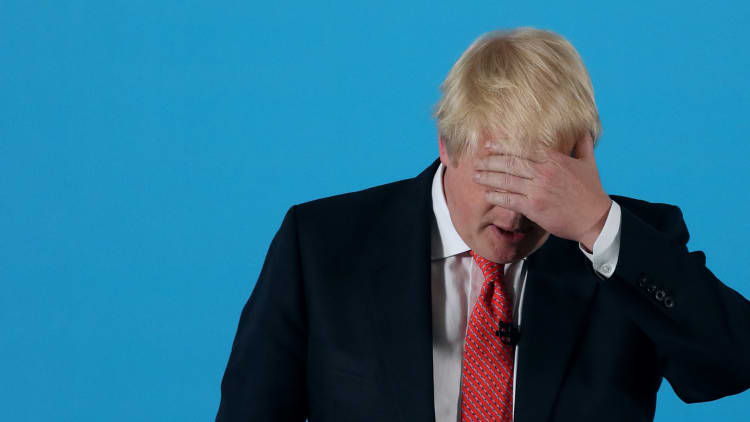LONDON — The EU is ready to negotiate a zero-tariff trade deal with the United Kingdom but the relationship between the two sides will never be the same, the European Commission President said Wednesday at an event in London.
"The truth is that our partnership cannot and will not be the same as before. And it cannot and will not be as close as before, because with every choice comes a consequence," Ursula von der Leyen, who took over the presidency of the EU's executive arm in December, said at the London School of Economics.
The U.K. is scheduled to leave the European Union in 23 days, on January 31 — becoming the first member state to do so. This will kickstart a transition period, when London and Brussels will engage in new negotiations that will include future trade arrangements. However, both sides have been at odds over the length of that next phase.
"The European Union is ready to negotiate a truly ambitious and comprehensive new partnership with the United Kingdom," von der Leyen said. However, she warned that "without an extension of the transition period beyond 2020, you cannot expect to agree on every single aspect of our new partnership."
"The transition time is very, very tight," she said, adding there's a maximum 10 months to negotiate new trade arrangements, so these can be ratified before December.
U.K. Prime Minister Boris Johnson has pushed legislation to force trade talks with the European Union to end by no later than December. Johnson has made it clear that he is seeking an "ambitious" free trade arrangement with the EU, similar to a deal Europe negotiated with Canada — the Comprehensive Economic and Trade Agreement (CETA). That deal took seven years to negotiate and has yet to be fully ratified by national parliaments in Europe.
If there is no trade agreement between the U.K. and the EU, businesses could find themselves trading on World Trade Organization terms – potentially meaning higher tariffs and barriers to commerce. This possibility is often described as a "no-deal" or "cliff-edge" Brexit.

"We are ready to design a new partnership with zero tariffs, zero quotas, zero dumping. A partnership that goes well beyond trade and is unprecedented in scope. Everything from climate action to data protection, fisheries to energy, transport to space, financial services to security. And we are ready to work day and night to get as much of this done within the timeframe we have," Ursula von der Leyen said.
"None of this means it will be easy, but we start this negotiation from a position of certainty, goodwill, shared interests and purpose. And we should be optimistic," she added.
Von der Leyen is set to meet the U.K. prime minister in London Wednesday afternoon.
A spokesperson for Downing Street said Tuesday night that "there will be no extension to the Implementation Period, which will end in December 2020."
The same spokesperson added that Johnson "is expected to tell President Von Der Leyen that, having waited for over three years to get Brexit done, both British and EU citizens rightly expect negotiations on an ambitious free trade agreement (FTA) to conclude on time."
However, during her speech at the LSE, von der Leyen made it clear that "the more divergence there is, the more distant the partnership will be."
The U.K. and the EU are set to decide whether to extend the transition period beyond 2020 at a summit before the end of June. Von der Leyen said she would prefer to "look at the whole scenery before the summer starts, because we might together want to take a reconsideration of the timeframe before the 1st of July."


